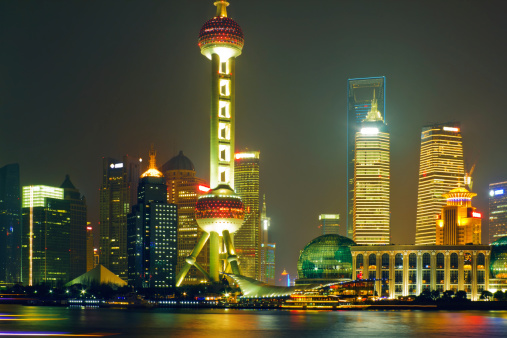It was not that long ago that emerging markets and developing markets outside of the United States were in trouble. Now it seems as though the bull market fever in the United States has rekindled interest in many of the battered stock markets around the globe. This is even the case for China, which has in recent weeks started to get slightly better news that points to more of a slow global growth scenario.
24/7 Wall St. has decided to review 10 of the better known Chinese stocks that trade as American Depositary Shares (ADSs) in New York. We are looking for potential upside in each of these names, under a mild bull market scenario continuing through 2014.
The Shanghai composite is back to within 10% of a 52-week high. This may be far short of the record highs of the Down Jones Industrial Average and S&P 500 in America, but this is far better than things were looking just a few months ago.
China was referred to as the growth engine of the world for years and years. Now, GDP growth of 5% or 6% is deemed too low to sustain its own ambitions. There are still long-term concerns about China’s debt and bank loans, as well as the notion that the nation was overdeveloped and has many business districts and high-rise living buildings that were built out but have virtually no occupants.
For these stocks to continue performing well, the outlook is not based on a raging bull market. It is simply based on a stable to moderately higher stock market in 2014. Each company has its own merits, and of course each company has its own risks. Most of the stocks also have stock options that trade and can be used to limit downside risk, or for call option buyers who would rather look at options rather than the full price of shares.
These are the 10 best Chinese ADSs that 24/7 Wall St. sees for the rest of 2014 as of early June.
ALSO READ: Ten Strategies to Invest Like Warren Buffett
Baidu Inc. (NASDAQ: BIDU) is the largest search provider in China, and it has been referred to by investors as the “Google of China” for a decade or more. Baidu is supposed to also have one of the more straightforward balance sheets compared to Chinese companies. With shares above $170, the 52-week range is $88.08 to $189.34. Baidu’s market cap is a whopping $61 billion, but this is only one-sixth the size of Google, and the company is much more focused than Google in search, online activity and advertising.
Investing in Baidu is great when you get the timing right and awful if you catch a market sell-off, but this could easily reach $200 and far higher if the bull market thesis holds up into 2015.
Canadian Solar Inc. (NASDAQ: CSIQ) is headquartered in Canada, but virtually all the company’s solar wafers, cells and modules are manufactured in China. In addition to its Chinese competitors, U.S. solar makers like SunPower, SunEdison and First Solar compete in the same space. And like its U.S. counterparts, Canadian Solar has developed a project pipeline that focuses on solar installations in Japan. In the past 12 months, the share price has risen nearly 140%, but since posting a 52-week high of $44.50 in early March, shares have lost 45% and the company’s market cap has dropped to around $1.3 billion.
The consensus price target on the stock is around $42.30 on Canadian Solar, almost 75% above the stock’s $24 share price. This stock rose more than 1,000% in two years as solar panel prices stabilized, and while it likely won’t perform like that again, if the market’s bull run continues, Canadian Solar is well-positioned to post good growth.
China Petroleum & Chemical Corp. (NYSE: SNP) is also referred to as Sinopec, and this is the state-owned oil and gas giant of China that would be considered just like Exxon Mobil, Chevron, BP, Shell and other oil giants. The company is competing for oil and gas resources around the world against U.S. and European energy giants at every turn. The ADSs recently peaked above $95, but this briefly challenged $120 in the 2007 to 2008 oil boom. Sinopec is making partnerships globally and has a daunting task of providing massive amounts of oil and gas as the gas and energy source for well over a billion people.
One drag is that investors have a hard time knowing exactly what they own here with that state-ownership status. Still, this could easily rise back above $100 again under a bull market thesis — and maybe even rise to its former highs. Its dividend is sporadic, but it screens as being above 4%.
China Unicom (Hong Kong) Ltd. (NYSE: CHU) is far behind China Mobile in size ($38 billion market cap vs. $190 billion), but that may be a blessing, and it is believed to have better network capacity for its cellular, landline, broadband, and communications infrastructure. Among all of its lines and accounts, China Unicom claims some 444 million (yes, three fours) total subscribers. At $15, its shares have traded in a range of $11.71 to $17.19 in the past year. Still, this has been a $20 stock in 2011 and prior to the recession.
China Unicom could use a better dividend than the 1.6% listed, but the analysts have a consensus price target above $17. This could reach that $17 mark and maybe even $19 or $20, as long as the company can keep adding ways to serve its massive customer base.
E-Commerce China Dangdang Inc. (NYSE: DANG) is a business-to-consumer player in China, and its shares have been forgotten about. This has been called the Amazon of China, and the coming Alibaba initial public offering (IPO) may have changed how investors look at the company. Shares have recovered to $11 from a low of under $5 last year, but the shares have slid from a high of $19 since the focus has moved to Alibaba. The company is also worth just under $1 billion, versus sales of $1.04 billion in 2013, and Thomson Reuters is calling for $1.3 billion in 2014 revenue.
If investors think that the company can live up to or exceed its $0.45 per share earnings target for 2015, then E-Commerce China Dangdang seems like it could easily get back above $15.
JD.com Inc. (NASDAQ: JD) held its IPO less than a month ago and shares are up nearly 50% after pricing above the expected range. The biggest direct selling online retailer in China now has market cap just shy of $39 billion. JD.com faces formidable competition from both Alibaba’s Taobao.com and Amazon, but it does have a deal with China’s other big online retailer, Tencent Holdings, that gives the company prominent access to Tencent’s mobile chat and messaging apps.
JD.com shares are heavily traded, with daily average volume of nearly 15.5 million shares. What will drive the stock price is both the anticipation and the outcome of the forthcoming IPO of Alibaba, which many observers think will be the largest ever, valuing the Chinese e-commerce giant as high as $245 billion. JD.com set the table for Alibaba, and Alibaba is about ready to return the favor.
ALSO READ: Twelve Analyst Stocks to Buy Under $10 With Huge Implied Upside
Melco Crown Entertainment Ltd. (NASDAQ: MPEL) owns and operates resorts and casinos in Asia with prime properties in the Chinese gambling mecca of Macau. Over the past 12 months, the stock price has risen nearly 28%, giving the company a market cap of nearly $16.5 billion. The not-so-good news is that shares are down 33% since hitting their 52-week high of $45.70 in early March as gaming volumes have tapered in Macau. The company’s 1.5% dividend yield is lower than either Las Vegas Sands (2.7%) or Wynn Resorts (2.4%). All the gambling and resort companies are being hurt by a recent decision by Macau’s regulators to restrict further the use UnionPay cards in the island’s casinos. Casino revenue for Macau rose 9.3% in May and is expected to rise another 1% to 5% in June.
Melco Crown’s forward price-to-earnings (P/E) ratio is lower than any of the other casino owners, and its implied upside of nearly 60% is much higher than either Las Vegas Sands or Wynn.
SINA Corp. (NASDAQ: SINA) is another of China’s top Internet companies, offering advertising driven portals for both desktop and mobile users. It is also the majority owner of Weibo, which is often referred to as the Twitter of China. SINA’s market cap has dropped 50% to around $3 billion since peaking last October at $92.83. The stock posted its 52-week low of $42.40 late last month. The Chinese government yanked several of SINA’s licenses in April, charging the company with hosting pornographic content.
SINA shares have been pounded to the point that some might not think it can keep dropping in a bull market. Its stock is likely to rise, perhaps handily, once the company straightens out its troubles with the government. The company’s implied gain based on a consensus price target of around $72 is 58%. Whether that is realistic is arguable, and a lot depends on how Weibo performs. But there is an opportunity here.
ALSO READ: Five Analyst Stock Picks With 100% or More Implied Upside
Trina Solar Ltd. (NYSE: TSL) is among the top producers of solar power systems globally, competing against many solar companies in China, the United States and elsewhere. A fresh capital raise of $150 million in notes and 8.8 million shares sold may help buffer the recent tariff and duties war that recently came from the United States. At $11.15, its 52-week range is $5.00 to $18.77, and its market cap is close to $900 million before considering the new shares and convertible notes. Sales were $1.77 billion in 2013 and are expected to grow to almost $2.5 billion in 2014 and almost $3 billion in 2015.
Trina Solar‘s 2014 is supposed to be the breakout year for profits, and it trades at only about 10 times expected earnings. Thomson Reuters has a consensus price target of $19, but this may now be tempered to upside of say $15 in a mild bull market and recovery scenario ahead, based on the new tariff impact.
Yingli Green Energy Holding Co. Ltd. (NYSE: YGE) is another Chinese solar maker that focused on a vertically integrated manufacturing model, making everything from silicon wafers to finished panels. And like its Chinese compatriots, the company now faces a new U.S. tariff following the closure of a loophole that let Yingli, Trina Solar and others ship panels that had been assembled from Chinese parts in another country. Yingli’s market cap is a modest $455 million, with shares about 65% below the high of $8.77 posted last October.
Yingli’s implied gain based on a consensus analyst price target of around $5.60 is a whopping 92% above the recent closing price of $2.93. In a bull market, Yingli is worth more than $3 a share — maybe not as much as the current price target, but certainly more than $4.
In conclusion, we would remind readers that these are based on a stable to gradually rising stock market. All of these would likely fall if the U.S. experiences an unexpected serious sell-off. Also, keep in mind that none of these company shares are appropriate for what is called “widows and orphans” in suitability tests. China comes with huge opportunity, but there are also risks that quite frankly most investors do not know about nor that they pay attention to. These outlooks are as of early June, so they can change at any time. The outlook on each will certainly change with market conditions and as their prices change, and based on the news flow of each company.
Thank you for reading! Have some feedback for us?
Contact the 24/7 Wall St. editorial team.



